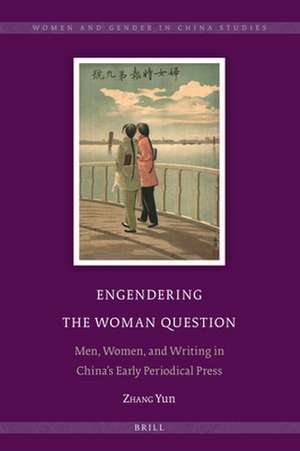Engendering the Woman Question: Men, Women, and Writing in China’s Early Periodical Press: Women and Gender in China Studies, cartea 12
Autor Yun Zhangen Limba Engleză Hardback – 2 sep 2020
Drawing upon a variety of novel textual modes such as polemical essays, historical biography, public speech, and expository essays, this book opens a window onto men’s and women’s gender-specific approaches to a series of prominent topics central to the Chinese woman question in the early twentieth century.
Preț: 704.35 lei
Preț vechi: 858.96 lei
-18% Nou
Puncte Express: 1057
Preț estimativ în valută:
134.77€ • 141.10$ • 111.52£
134.77€ • 141.10$ • 111.52£
Carte indisponibilă temporar
Doresc să fiu notificat când acest titlu va fi disponibil:
Se trimite...
Preluare comenzi: 021 569.72.76
Specificații
ISBN-13: 9789004438538
ISBN-10: 900443853X
Dimensiuni: 155 x 235 mm
Greutate: 0 kg
Editura: Brill
Colecția Brill
Seria Women and Gender in China Studies
ISBN-10: 900443853X
Dimensiuni: 155 x 235 mm
Greutate: 0 kg
Editura: Brill
Colecția Brill
Seria Women and Gender in China Studies
Cuprins
Acknowledgements
List of Figures
Introduction
1 Articulating the Woman Question: Women’s Literary Heritage, Education, and the Nation
1 The Mixed-Gender Public Space in Nü xuebao
2 Debates on the Cainü Legacy
3 Asserting Intellectual Authority in the Public Space
4 Ambivalence: a Debate of Linguistic Registers
5 Conclusion
2 Nationalism and Beyond: Nüjie and the Construction of a New Gendered Collective Identity
1 The Cure for the Nation: Mobilizing Nüjie
2 A Nüjie of Their Own
3 Beyond Nationalism: Demanding a Revolution in Nüjie
4 Conclusion
3 The Manchu Woman Commits Suicide: Ethnicity and the Composition of the New Chinese Woman
1 A Sacrificial Martyr for a National Cause
2 Making a Manchu Heroine
3 Ethnicity and Gender: Manchu Women’s Envisioning of Modern Womanhood
4 Conclusion
4 Fashioning Hygienic Womanhood: Women’s Health and Bodies in Commercial Women’s Journals
1 The Mixed-Gender Public Space of the Commercial Women’s Journals: Male Editorial Agency and Female Authorial Subjectivity
2 The Ideal of “Wise Mothers and Good Wives”
3 Women and Weisheng in the Household
4 Women’s Hygiene and Reproductive Health
4.1 Menstruation
4.2 Childbirth
5 Conclusion
5 Policing Girl Students
1 Female Students in the Late Qing
2 The Republican Girl Students
3 Debates on Girl Students
4 Personal Accounts from Girl Students
5 Conclusion
Conclusion
Works Cited
Index
List of Figures
Introduction
1 Articulating the Woman Question: Women’s Literary Heritage, Education, and the Nation
1 The Mixed-Gender Public Space in Nü xuebao
2 Debates on the Cainü Legacy
3 Asserting Intellectual Authority in the Public Space
4 Ambivalence: a Debate of Linguistic Registers
5 Conclusion
2 Nationalism and Beyond: Nüjie and the Construction of a New Gendered Collective Identity
1 The Cure for the Nation: Mobilizing Nüjie
2 A Nüjie of Their Own
3 Beyond Nationalism: Demanding a Revolution in Nüjie
4 Conclusion
3 The Manchu Woman Commits Suicide: Ethnicity and the Composition of the New Chinese Woman
1 A Sacrificial Martyr for a National Cause
2 Making a Manchu Heroine
3 Ethnicity and Gender: Manchu Women’s Envisioning of Modern Womanhood
4 Conclusion
4 Fashioning Hygienic Womanhood: Women’s Health and Bodies in Commercial Women’s Journals
1 The Mixed-Gender Public Space of the Commercial Women’s Journals: Male Editorial Agency and Female Authorial Subjectivity
2 The Ideal of “Wise Mothers and Good Wives”
3 Women and Weisheng in the Household
4 Women’s Hygiene and Reproductive Health
4.1 Menstruation
4.2 Childbirth
5 Conclusion
5 Policing Girl Students
1 Female Students in the Late Qing
2 The Republican Girl Students
3 Debates on Girl Students
4 Personal Accounts from Girl Students
5 Conclusion
Conclusion
Works Cited
Index
Notă biografică
Zhang Yun, Ph.D. (2015), The University of Hong Kong, is a Postdoctoral Fellow in the School of Humanities at Nanyang Technological University, Singapore. She has published articles and translations on women’s and gender history and Chinese literary and print culture.











